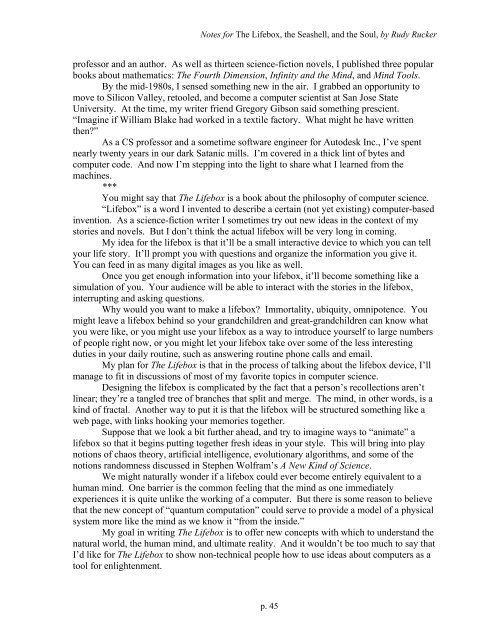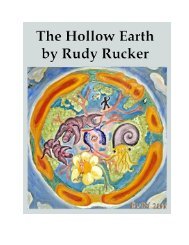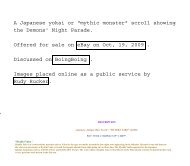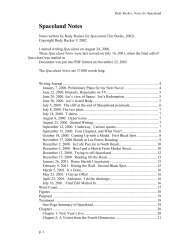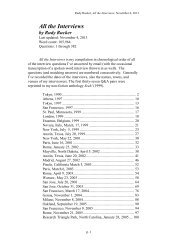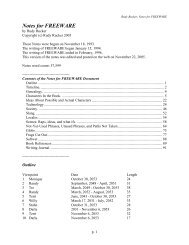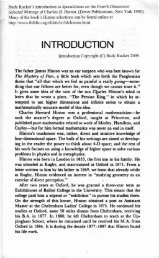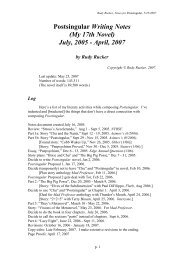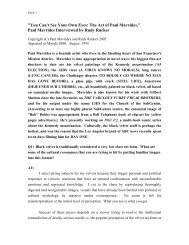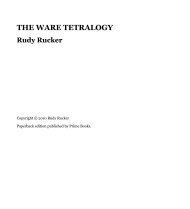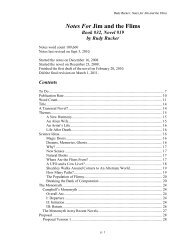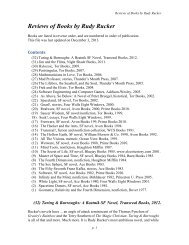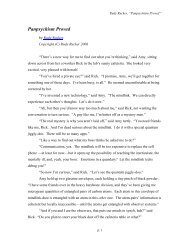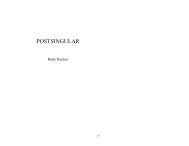Notes for the Lifebox, the Seashell, and the Soul - Rudy Rucker
Notes for the Lifebox, the Seashell, and the Soul - Rudy Rucker
Notes for the Lifebox, the Seashell, and the Soul - Rudy Rucker
Create successful ePaper yourself
Turn your PDF publications into a flip-book with our unique Google optimized e-Paper software.
<strong>Notes</strong> <strong>for</strong> The <strong>Lifebox</strong>, <strong>the</strong> <strong>Seashell</strong>, <strong>and</strong> <strong>the</strong> <strong>Soul</strong>, by <strong>Rudy</strong> <strong>Rucker</strong><br />
professor <strong>and</strong> an author. As well as thirteen science-fiction novels, I published three popular<br />
books about ma<strong>the</strong>matics: The Fourth Dimension, Infinity <strong>and</strong> <strong>the</strong> Mind, <strong>and</strong> Mind Tools.<br />
By <strong>the</strong> mid-1980s, I sensed something new in <strong>the</strong> air. I grabbed an opportunity to<br />
move to Silicon Valley, retooled, <strong>and</strong> become a computer scientist at San Jose State<br />
University. At <strong>the</strong> time, my writer friend Gregory Gibson said something prescient.<br />
“Imagine if William Blake had worked in a textile factory. What might he have written<br />
<strong>the</strong>n?”<br />
As a CS professor <strong>and</strong> a sometime software engineer <strong>for</strong> Autodesk Inc., I’ve spent<br />
nearly twenty years in our dark Satanic mills. I’m covered in a thick lint of bytes <strong>and</strong><br />
computer code. And now I’m stepping into <strong>the</strong> light to share what I learned from <strong>the</strong><br />
machines.<br />
***<br />
You might say that The <strong>Lifebox</strong> is a book about <strong>the</strong> philosophy of computer science.<br />
“<strong>Lifebox</strong>” is a word I invented to describe a certain (not yet existing) computer-based<br />
invention. As a science-fiction writer I sometimes try out new ideas in <strong>the</strong> context of my<br />
stories <strong>and</strong> novels. But I don’t think <strong>the</strong> actual lifebox will be very long in coming.<br />
My idea <strong>for</strong> <strong>the</strong> lifebox is that it’ll be a small interactive device to which you can tell<br />
your life story. It’ll prompt you with questions <strong>and</strong> organize <strong>the</strong> in<strong>for</strong>mation you give it.<br />
You can feed in as many digital images as you like as well.<br />
Once you get enough in<strong>for</strong>mation into your lifebox, it’ll become something like a<br />
simulation of you. Your audience will be able to interact with <strong>the</strong> stories in <strong>the</strong> lifebox,<br />
interrupting <strong>and</strong> asking questions.<br />
Why would you want to make a lifebox? Immortality, ubiquity, omnipotence. You<br />
might leave a lifebox behind so your gr<strong>and</strong>children <strong>and</strong> great-gr<strong>and</strong>children can know what<br />
you were like, or you might use your lifebox as a way to introduce yourself to large numbers<br />
of people right now, or you might let your lifebox take over some of <strong>the</strong> less interesting<br />
duties in your daily routine, such as answering routine phone calls <strong>and</strong> email.<br />
My plan <strong>for</strong> The <strong>Lifebox</strong> is that in <strong>the</strong> process of talking about <strong>the</strong> lifebox device, I’ll<br />
manage to fit in discussions of most of my favorite topics in computer science.<br />
Designing <strong>the</strong> lifebox is complicated by <strong>the</strong> fact that a person’s recollections aren’t<br />
linear; <strong>the</strong>y’re a tangled tree of branches that split <strong>and</strong> merge. The mind, in o<strong>the</strong>r words, is a<br />
kind of fractal. Ano<strong>the</strong>r way to put it is that <strong>the</strong> lifebox will be structured something like a<br />
web page, with links hooking your memories toge<strong>the</strong>r.<br />
Suppose that we look a bit fur<strong>the</strong>r ahead, <strong>and</strong> try to imagine ways to “animate” a<br />
lifebox so that it begins putting toge<strong>the</strong>r fresh ideas in your style. This will bring into play<br />
notions of chaos <strong>the</strong>ory, artificial intelligence, evolutionary algorithms, <strong>and</strong> some of <strong>the</strong><br />
notions r<strong>and</strong>omness discussed in Stephen Wolfram’s A New Kind of Science.<br />
We might naturally wonder if a lifebox could ever become entirely equivalent to a<br />
human mind. One barrier is <strong>the</strong> common feeling that <strong>the</strong> mind as one immediately<br />
experiences it is quite unlike <strong>the</strong> working of a computer. But <strong>the</strong>re is some reason to believe<br />
that <strong>the</strong> new concept of “quantum computation” could serve to provide a model of a physical<br />
system more like <strong>the</strong> mind as we know it “from <strong>the</strong> inside.”<br />
My goal in writing The <strong>Lifebox</strong> is to offer new concepts with which to underst<strong>and</strong> <strong>the</strong><br />
natural world, <strong>the</strong> human mind, <strong>and</strong> ultimate reality. And it wouldn’t be too much to say that<br />
I’d like <strong>for</strong> The <strong>Lifebox</strong> to show non-technical people how to use ideas about computers as a<br />
tool <strong>for</strong> enlightenment.<br />
p. 45


